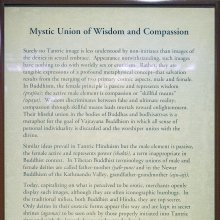Upaya, Ūpāya, Upāyā, Upāya, Upayā: 35 definitions
Introduction:
Upaya means something in Buddhism, Pali, Hinduism, Sanskrit, the history of ancient India, Marathi, Hindi. If you want to know the exact meaning, history, etymology or English translation of this term then check out the descriptions on this page. Add your comment or reference to a book if you want to contribute to this summary article.
Upaya has 33 English definitions available.
Alternative spellings of this word include Upay.
Images (photo gallery)
Languages of India and abroad
Sanskrit dictionary
[Deutsch Wörterbuch]
Source: Cologne Digital Sanskrit Dictionaries: Böhtlingk and Roth Grosses Petersburger WörterbuchUpāya (उपाय):—(von 3. i mit upa) m.
1) Herbeikunft [Medinīkoṣa y. 75.] aho duṣṭaḥ kāyastadapi maraṇopāyacakitaḥ [Bhartṛhari 3, 10.] —
2) wodurch man zu seinem Ziel gelangt, Mittel, Weg, fein angelegtes Mittel, List [Amarakoṣa 3, 4, 3, 23. 23, 142.] [Muṇḍakopaniṣad 3, 2, 4.] sarvopāyaistathā kuryānnītijñaḥ pṛthivīpatiḥ . yathāsyābhyadhikā na syurmitrodāsīnaśatravaḥ .. [Manu’s Gesetzbuch 7, 177. 8, 48. 190. 9, 312. 11, 112.] [Bhagavadgītā 6, 36.] [Nalopākhyāna 26, 9.] [Viśvāmitra’s Kampf 13, 27.] [Rāmāyaṇa 1, 8, 15. 9, 1. 8.] [Amaruśataka 21.] [Kathāsaritsāgara 20, 2. 25, 32.] [BURN. Lot. de Lassen’s Anthologie b. l. 549. fg.] upāyena hi tatkuryādyanna śakyaṃ parākramaiḥ [Pañcatantra I, 233.] upāyo vihitaścāyaṃ tvadarthamatulo nayā [Nalopākhyāna 24, 33.] ayamupāyaścintito mahān [19, 4.] upāyo yaṃ mayā dṛṣṭo nirapāyaḥ [4, 19.] upāyamanapāyam [Rāmāyaṇa 3, 44, 8.] saṃśayātmakaḥ [Pañcatantra I, 10.] cintayitvā ca tasyopāyānbahūṃstataḥ Mittel dieses in’s Werk zu setzen [Rāmāyaṇa 1, 8, 21.] nānyo sti kaścidupāyo smākaṃ jīvitasya [Pañcatantra 161, 9.] kaṃ kariṣyatyupāyam [Rāmāyaṇa 5, 6, 5.] vadhārthaṃ tasya bhagavannupāyaṃ kartumarhasi [1, 14, 19.] mayā tāvadeteṣāṃ vadhāyopāyaścintanīyaḥ [Pañcatantra 191, 9.] upāyo yaṃ mayā dṛṣṭo naiṣadhānayane tava [Nalopākhyāna 24, 24.] sarvopāyaṃ ca vartiṣye vinivartayituṃ vanāt [Rāmāyaṇa 2, 82, 18.] etairupāyayogaiḥ [Manu’s Gesetzbuch 9, 10.] saṃyuktānviyuktāṃśca sarvopāyāṃsṛjedbudhaḥ [7, 214.] bhedo daṇḍaḥ sāma dānamityupāyacatuṣṭayam (den Feind zu bezwingen) [Amarakoṣa 2, 8, 1, 20.] [Hemacandra’s Abhidhānacintāmaṇi 736.] [Medinīkoṣa y. 75.] [Manu’s Gesetzbuch 7, 108. 109. 200.] [Yājñavalkya’s Gesetzbuch 1, 345.] kaccidrājaguṇaiḥ ṣaḍbhiḥ saptopāyāṃstathānagha (die [4] eben erwähnten und die [3] sogenannten kṣudropāyāḥ; s. [Hemacandra’s Abhidhānacintāmaṇi 738]) .. balābalena samyaktvaṃ caturdaśa parīkṣase [Mahābhārata 2, 155.] in comp. mit dem Ziel: vṛttyupāyān [Manu’s Gesetzbuch 10, 2.] hantāyaṃ vihitastasya vadhopāyaḥ [Rāmāyaṇa 1, 14, 20.] [Pañcatantra 55, 6.] āharaṇopāya [Suśruta 1, 23, 15.] sādhanopāya [2, 46, 11.] arthopāyāścintanīyāḥ kartavyāśca [Pañcatantra 6, 7. 92, 3.] [Kathāsaritsāgara 10, 43. 138.] [Hemacandra’s Abhidhānacintāmaṇi 77.] mit dem Mittel selbst: śasyopāya [Aśvalāyana’s Śrautasūtrāni 9, 10.] hanyāccitrairvadhopāyairudvejanakarairnṛpaḥ [Manu’s Gesetzbuch 9, 248.] [Suśruta 1, 26, 20.] yantropāya [359, 11.] sukhopāyena auf eine leichte Art [Pañcatantra 211, 10.] am Ende eines adj. comp. f. āḥ buddhimāsthāya sopāyām [Mahābhārata 3, 1306.] —
3) das Einstimmen in den Gesang: tatra hoturnidhanopāyaḥ [Śāṅkhāyana’s Gṛhyasūtrāṇi 5, 12, 4.] — Vgl. upakrama und apāya .
--- OR ---
Upāya (उपाय):—
2) gavāmayanasyopāyāṃścaturaḥ pratipādayet vier Wege zu [WEBER, Nakṣ. 2, 284.] dvāvupāyāviha proktau vimuktau śatrudarśane zwei Mittel zur Rettung [Spr. 1275.] durjanaṃ sajjanaṃ kartumupāyo nahi bhūtale [4195.] evaṃ rāṣṭramupāyena bhuñjāno labhate phalam auf die rechte Weise [4917.] upāyopanyāsa Titel des 1ten Acts im Madhurāniruddha [Oxforder Handschriften 142,a. No. 290.]
Source: Cologne Digital Sanskrit Dictionaries: Sanskrit-Wörterbuch in kürzerer FassungUpāya (उपाय):—m. —
1) Annäherung [Indische sprüche 3772] v.l. —
2) Mittel [Gautama's Dharmaśāstra] Weg zu , fein angelegtes Mittel , Kunstgriff , List. upāyena und upāyatas ([136,5]) auf die rechte Weise , auf kluge Weise. —
3) das Anstimmen eines Gesanges [Śāṅkhāyana’s Śrautasūtra (Weber) 5,12,4.]
Sanskrit, also spelled संस्कृतम् (saṃskṛtam), is an ancient language of India commonly seen as the grandmother of the Indo-European language family (even English!). Closely allied with Prakrit and Pali, Sanskrit is more exhaustive in both grammar and terms and has the most extensive collection of literature in the world, greatly surpassing its sister-languages Greek and Latin.
See also (Relevant definitions)
Starts with (+89): Upaya Sutta, Upaya-komuki, Upaya-vetantacariyar, Upayabala, Upayac, Upayacaka, Upayacana, Upayacati, Upayacatushtaya, Upayach, Upayachaka, Upayachana, Upayachatushtaya, Upayachinta, Upayachita, Upayachitaka, Upayaci, Upayacinta, Upayacita, Upayacitaka.
Ends with (+52): Abhyupaya, Adhupaya, Adupaya, Alpopaya, Anabhyupaya, Anupaya, Asuriupaya, Aupaya, Bahupaya, Bahyupaya, Belapatri Rupaya, Belapuri Rupaya, Bhatavadi Rupaya, Catur-upaya, Caturupaya, Caupaya, Chupaya, Dewa-rupaya, Dhupaya, Dhyanopaya.
Full-text (+266): Abhyupaya, Upayana, Upayayoga, Anupaya, Upayaturiya, Upayajna, Samupaya, Upayayin, Vrittyupaya, Caturupayam, Aupayika, Upayacinta, Ayahshula, Upayata, Ratryupaya, Uvaya, Upayakshepa, Upayati, Upayika, Upaya Sutta.
Relevant text
Search found 87 books and stories containing Upaya, Ūpāya, Upāyā, Upāya, Upayā, Upa-ya, Upā-yā, Upa-yā; (plurals include: Upayas, Ūpāyas, Upāyās, Upāyas, Upayās, yas, yās). You can also click to the full overview containing English textual excerpts. Below are direct links for the most relevant articles:
Cidgaganacandrika (study) (by S. Mahalakshmi)
Part 5 - Three Upayas (means to enter universal God consciousness) < [Philosophy of Kashmir Tantric System]
Part 3 - Philosophical aspects of Kashmir Śaivism < [Krama system and Trika school]
Part 1b - Śāktopāya (spiritual progression) < [Krama system and Trika school]
Nitiprakasika (Critical Analysis) (by S. Anusha)
Upāyas (Nītiprakāśikā VIII. 73-9) < [Chapter 4]
Peace Time Strategy (Introduction) < [Chapter 4]
Aṣṭādaśa-tīrtha (18 chief councillors and officials) < [Chapter 4]
Brihad Bhagavatamrita (commentary) (by Śrī Śrīmad Bhaktivedānta Nārāyana Gosvāmī Mahārāja)
Verse 2.2.158 < [Chapter 2 - Jñāna (knowledge)]
Verse 2.4.240 < [Chapter 4 - Vaikuṇṭha (the spiritual world)]
Verse 1.7.5 < [Chapter 7 - Pūrṇa (pinnacle of excellent devotees)]
The Great Chariot (by Longchenpa)
Part 5 - How these are classified as the external secret mantra < [A. Resolving the view]
Part 6 - The divisions of the three inner tantras < [A. Resolving the view]
Part 8 - The ways in which the highest three are the principal ones < [A. Resolving the view]
Puranic encyclopaedia (by Vettam Mani)
Related products

